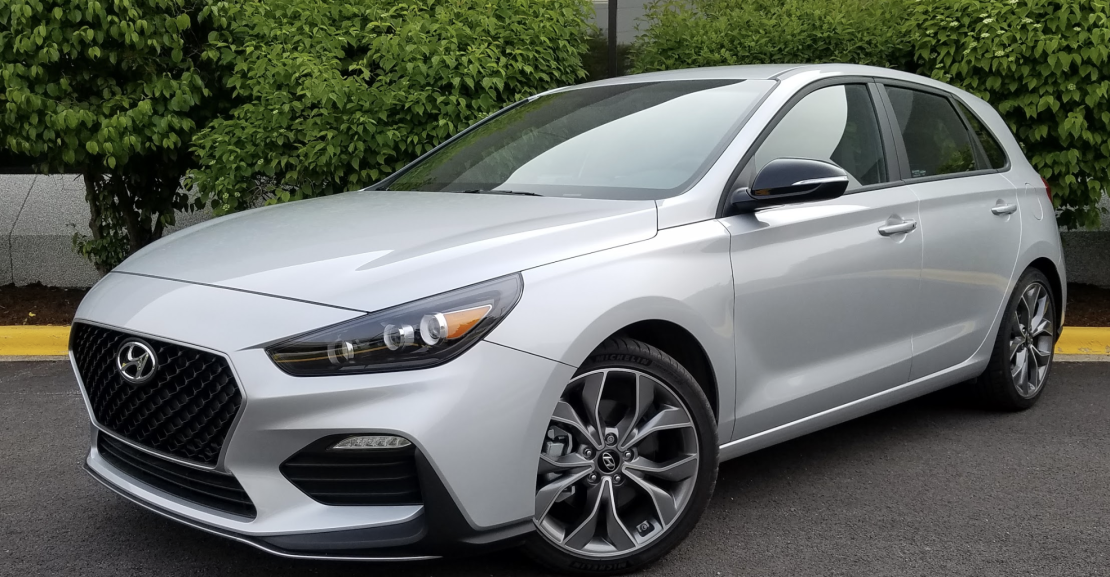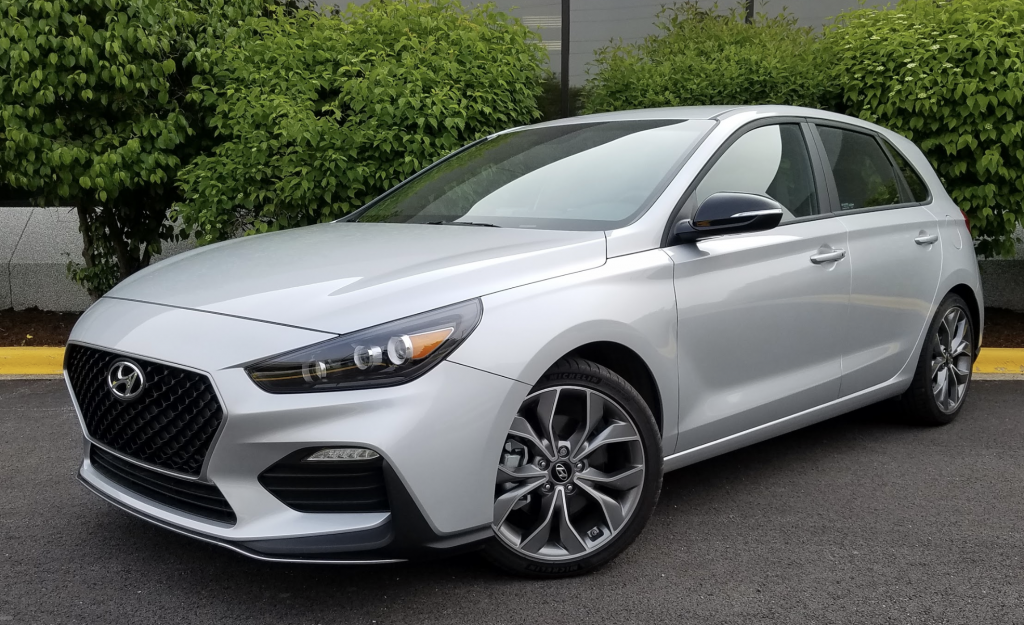
2019 Hyundai Elantra GT N Line
Class: Compact Car
Miles driven: 641
Fuel used: 22.7 gallons
| CG Report Card | |
|---|---|
| Room and Comfort | B |
| Power and Performance | B+ |
| Fit and Finish | B |
| Fuel Economy | B- |
| Value | B+ |
| Report-card grades are derived from a consensus of test-driver evaluations. All grades are versus other vehicles in the same class. Value grade is for specific trim level evaluated, and may not reflect Consumer Guide's impressions of the entire model lineup. | |
| Big & Tall Comfort | |
| Big Guy | B- |
| Tall Guy | B+ |
| Big & Tall comfort ratings are for front seats only. "Big" rating based on male tester weighing approximately 350 pounds, "Tall" rating based on 6'6"-tall male tester. | |
| Drivetrain | |
| Engine Specs | 201-hp 1.6-liter |
| Engine Type | Turbo four |
| Transmission | 6-speed manual |
| Drive | Front-wheel drive |
Real-world fuel economy: 28.2 mpg
Driving mix: 30% city, 70% highway
EPA-estimated fuel economy: 23/30/26 (city/highway combined)
Fuel type: Regular Gas
Base price: $23,335 (not including $885 destination charge)
Options on test vehicle: Carpeted floor mats ($125), wheel locks ($55)
Price as tested: $24,400
Quick Hits
The great: Sporty performance for the price, slick manual-transmission shifter
The good: Decent passenger room and cargo space for a car in this class
The not so good: Slightly jiggly ride, some low-speed turbo lag
More Elantra price and availability information
CG Says:
Hyundai has made quite the sporting push of late, recently introducing its high-performance Veloster N and Elantra GT N Line models – with more N Line versions reportedly on the way — both being elevations above previously existing sporting machinery.
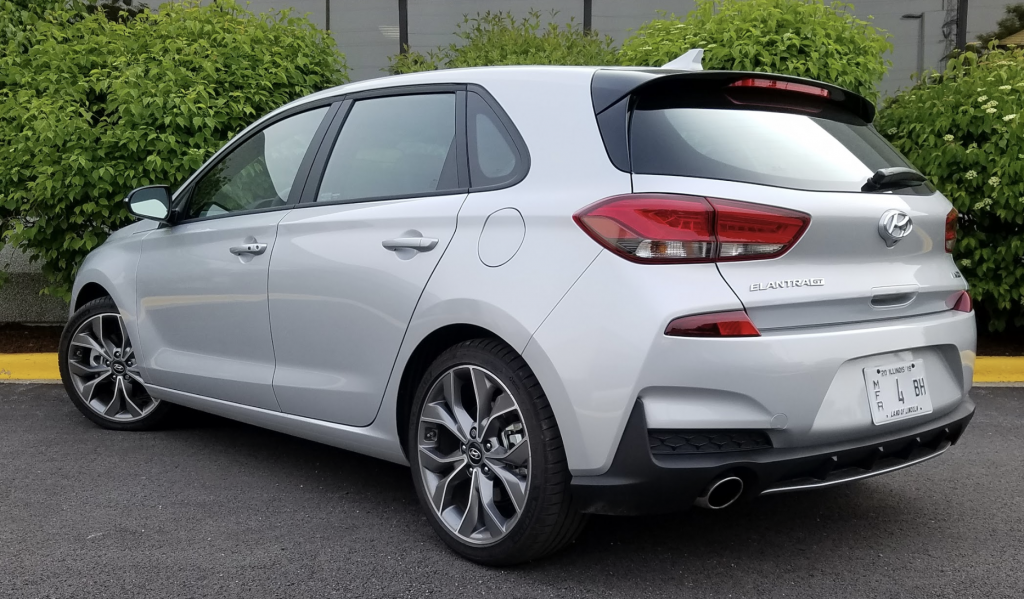
Although the Veloster N represents a big step up in terms of performance, the Elantra GT N Line largely mimics what last year was called the GT Sport, as both use the same 201-horsepower 1.6-liter turbo in place of the base GT’s (“GT” designating the hatchback version of the Elantra sedan) 161-hp 2.0-liter four. While both last year’s GT Sport and this year’s GT N Line have an independent rear suspension other GTs lack, the N Line has slightly stiffer springs, different wheels (we think “racier looking”), and some other minor tweaks compared to the GT Sport. But mostly the name change was probably to align the N Line with the new high-performance N models; think of the N Line as “N Lite,” and you’ll get the picture.
Otherwise, the GT N Line is much like the 2018 GT Sport reviewed last year, so we invite you to read that report for more details. And since Hyundai has already said that there are no changes to the Elantra GT for 2020, this review holds for the 2020 Elantra GT N Line as well.
Test Drive: 2019 Mazda 3 Hatchback Premium AWD

Although the GT N Line also offers a 7-speed automated manual transmission – which will likely be more popular – our test car was equipped with the base 6-speed manual … as was the 2018 GT Sport tested. In other Hyundais, we haven’t been particularly impressed with the 7-speed automated manual, but this 6-speed manual is a gem: smooth, short-throw shift action with a light and easily modulated clutch. It really brings out the qualities of the 1.6-liter turbo, which despite exhibiting some typical turbo lag at low speeds, pulls smoothly (if not very strongly) from as low as 1000 rpm — which isn’t always the case with small engines.
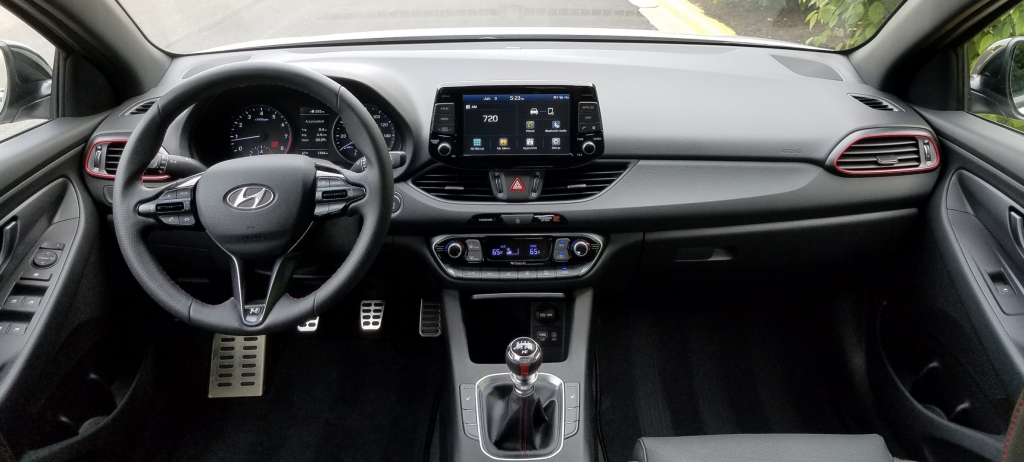
The N Line’s stiffer suspension vs. the normal GT’s quite expectedly detracts a bit from ride quality while making steering and handling sharper. While there was a little bit of brittleness over bumps, the ride was certainly tolerable, and about what could be expected of a sporting small car. Notable was that the steering exhibited quick turn-in and the car seemed to dive eagerly into corners, both contributing to the “fun-to-drive” factor.
Test Drive: Honda Civic Hatchback Sport Touring
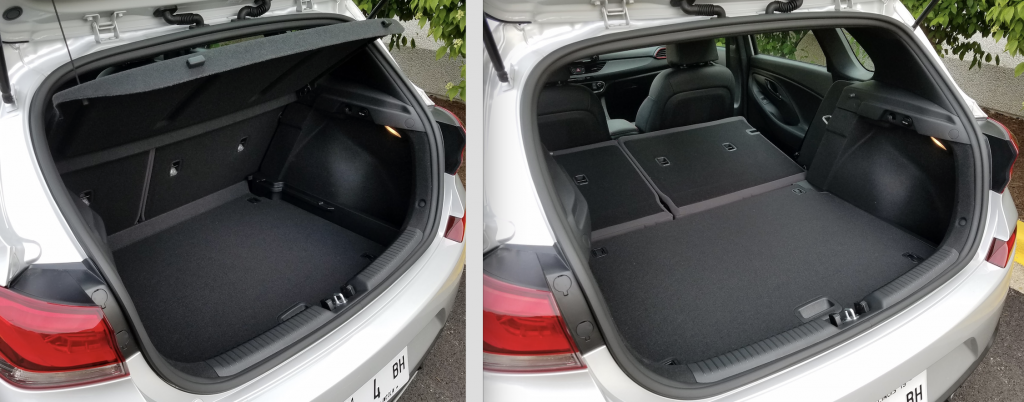
In most other regards, the Elantra N Line comes off as a well-thought-out small car with good hatchback versatility. Passenger room might be tight for larger folks but it’s fine for normal-size ones, as adults can fit comfortably in the rear seat (though 5’9 is about the limit for legroom if the seat ahead is pushed far back) and get their own climate vents (not always the case in low-priced cars). Most “touched” interior surfaces are padded, visibility is fairly good all around, there’s decent cabin storage space, and both the audio and climate controls are easy to use and reach, with the audio allowing you to mix bands (AM/FM/satellite) in “favorites.” Furthermore, the cargo compartment is wide at the rear and has a 2-tier floor — which rests level with the folded rear seat backs in its higher position, leaving lots of hidden storage beneath it — and the hatch lid has a handle that allows you to use a safer “underhand” grip to close it.
Among “hot hatch” entries — the original and king still being the Volkswagen GTI — the Elantra GT N Line comes off as being a strong contender at the lower end of the price spectrum, making it a great option for those seeking practical transportation with a sporting flair.
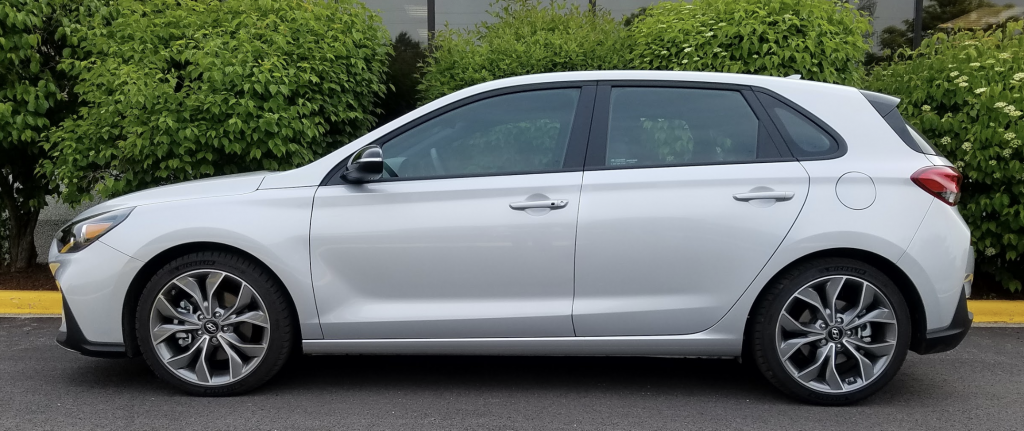
Check out our Compact Car Best Buys
2019 Hyundai Elantra GT N Line

